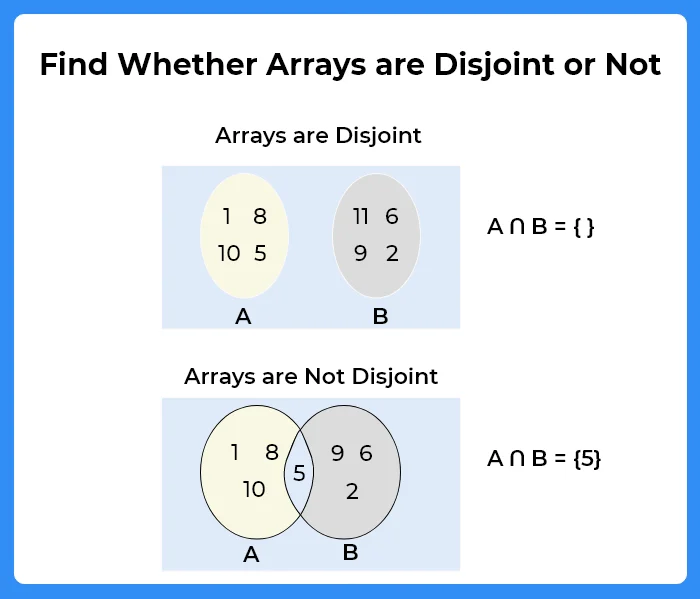Find whether arrays or disjoint or not using Python
Find whether arrays are disjoint or not
In this program we will find whether arrays are disjoint or not using Python.Two arrays are disjoint if they don’t have no element in common.The intersection of two disjoint sets is an empty set.

What is intersection and disjoint ?
Intersection is denoted by a symbol “∩” which when applied between two sets gives the common elements in the both sets/arrays. In python we can use either intersection( ) function or “&” symbol between two sets to find intersection.
set1= {1,2,3,4} and set2={5,6,7,8}
intersection of set1 and set2 is = { } . So this is disjoint.
set1 ={1,2,3,4} and set2={4,5,6,7}
intersection of set1 and set2 = {4} . So this is not disjoint


Method Discussed :
- Method 1 : Using Nested loop
- Method 2 : Using Sorting and Merging
- Method 3 : Using Set.
- Method 4 : Using Intersection function.
Let’s discuss above methods in brief,
Method 1:
- Input two arrays and pass them as arguments to a function
- In the body of function initialize a nested for loop
- Traverse the array 1 using the outer loop.Find whether arrays are disjoint or not using Python
- Use the inner loop to check if the elements in array 2 are found in array 1.
- If at least one element of array 2 is found in array 1, return False otherwise return True.
- If function returns True display “Disjoint”,otherwise “Not disjoint”
Method 1 : Python Code:
def fun(l1,l2):
for i in range(0,len(l1)):
for j in range(0,len(l2)):
if(l1[i]==l2[j]):
return False
return True
l1=list(map(int,input("Enter array1").split()))
l2=list(map(int,input("Enter array2").split()))
if(fun(l1,l2)):
print("Disjoint")
else:
print("Not disjoint") Output:
Enter array1 1 2 3 4 5
Enter array2 4 5 6 7 8
Not disjoint
Method 2 :
In this method we first sort both the arrays, then use the concept of merging to compare the elements.
Method 2 : Python Code
def areDisjoint(set1, set2, m, n):
# Sort the given two sets
set1.sort()
set2.sort()
# Check for same elements
# using merge like process
i = 0; j = 0
while (i < m and j < n):
if (set1[i] < set2[j]):
i += 1
elif (set2[j] < set1[i]):
j += 1
else: # if set1[i] == set2[j]
return False
return True
# Driver Code
arr1 = [12, 34, 11, 9, 3]
arr2 = [7, 2, 1, 5]
m = len(arr1)
n = len(arr2)
print("Yes") if areDisjoint(arr1, arr2, m, n) else print("No") Output
Yes
Method 3
In this method we will use set. First insert the elements of first array in set, then start iterating over the second array and check if the elements present in the set or not.
Method 3 : Python Code
def areDisjoint(set1, set2, n1, n2):
# Creates an empty hashset
myset = set([])
# Traverse the first set
# and store its elements in hash
for i in range (n1):
myset.add(set1[i])
for i in range (n2):
if (set2[i] in myset):
return False
return True
# Driver method to test above method
arr1 = [10, 5, 3, 4, 6]
arr2 = [8, 7, 9, 3]
n1 = len(arr1)
n2 = len(arr2)
if (areDisjoint(arr1, arr2, n1, n2)):
print ("Yes")
else:
print("No") Output
No
Method 4
- Read 1st array as set using set() function
- Read 2nd array as set using set() function
- By using intersection function in sets we can find whether there is any common element present in both sets or not
- If intersection is empty then it is disjoint , else if it has at least one element it is not a disjoint
Method 4 : Python code
l1=set(map(int,input("Enter array1 ").split()))
l2=set(map(int,input("Enter array2 ").split()))
if(l1.intersection(l2)):
print("Not a disjoint ")
else:
print("disjoint") Output:
Enter array1 1 2 3 4 5
Enter array2 6 7 9
disjoint
Prime Course Trailer
Related Banners
Get PrepInsta Prime & get Access to all 200+ courses offered by PrepInsta in One Subscription




set1={1,2,3,4}
set2={5,6,7,8,1}
res=set([])
for i in set1:
if i not in set2:
pass
else:
res.add(i)
print(res)
arr1 = [55,12, 34, 11, 9, 3, 1]
arr2 = [7, 2, 1, 5]
flag=0
for i in range(0,len(arr1)):
if arr1[i] in arr2:
flag=1
break
else:
flag=0
print(“There is disjoint” if flag==0 else “There is no disjoint”)
arr1=[12,34,11,9,3]
arr2=[4,5,6,7]
def disjoint(ar1,ar2):
for i in ar1:
if i in ar2:
return False
else:
return True
print(disjoint(arr1,arr2))
arr = [ 1, 10 , -1 ,4]
arr2 = [4,3,6,-10]
n = len(arr)
def f(arr,arr2,n):
for i in arr:
if i in arr2:
return False
return True
print(f(arr,arr2,n))
x = {2,4,6,8}
y = {1,3,5,7}
n = len(x)
for i in x:
if i not in y:
n-=1
if n==0:
print(‘sets are disjoint’)
else:
print(‘sets are not disjoint’)
Kindly reach out to us for technical queries on: Discord